Share this
When you read or hear about Turkana in the news media, most of the time it is stories about droughts, malnutrition, cattle rustling and other forms of insecurity. Turkana which is considered an arid land receives an average of 50.35mm of rainfall and only has 74. 28 days of rainfall annually.
Temperatures in Turkana are known to be very high with February recording the warmest days of up to 36.12ºC. This has had a great impact in the adoption of farming for subsistence or as an income-generating activity. Most of the residents of Turkana have been culturally known to prefer pastoralism to other forms of agriculture. Still, their herds of cattle, camels and donkeys are often harshly affected by droughts and insecurity.
Today, the face of the region is slowly changing as part of the residents begin to adopt other forms of agriculture. PanAfricare’s IMPACT programme is introducing residents of the county to simple solutions that is aimed at improving food security, boosting household income and by extension reducing the overreliance on pastoralism which is responsible for the inter-community conflict in northern Kenya.
Through the programme, many families are now developing kitchen gardens for a steady supply of vegetables. Cone gardens – is a new farming technology that has been introduced to help villagers have a steady supply of vegetables and other important food crops to help boost their nutrition.
A cone garden is one that resembles a cone, an ice cream holder. It involves arranging soil in a conical shape above the ground to create more space for crop growing. Plastic containers or heavy polythene sheets are used to make cones. Plastic containers or heavy polythene sheets are used to make cones.
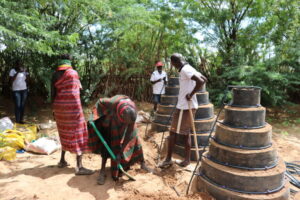
Elizabeth Erupe, a mother of three in Katilu village, is thrilled by the new gardening technology.
“I have only seen such gardens in Lodwar. We have been taught how to manage these gardens and I am confident that it will solve our vegetable problem and generally improve our diet,” she said.
“Enough food means that my children, especially those suckling, will get sufficient milk.”
The family, she said, had not enjoyed a meal with vegetables for a long time because of the lack of water that saw their kitchen gardens dry up.
“Cone gardens ensure we have a steady supply of vegetables because they come with storage tanks and irrigation pipes fitted onto them,” she said.
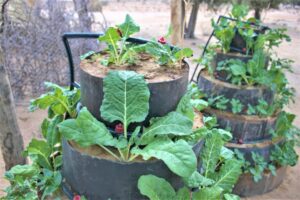
The irrigation system mirrors that of drip irrigation, where water slowly drops on the root of the plants. This is economical utilisation of water, especially in water-stressed areas like Turkana. Home cone gardens have been set up to support 200 women across Turkana County and are expected to increase the availability and consumption of diversified diets.
Israel Farm, established in 2013 by a group of 15 young men ( now grown to a membership of 20) is another project in Turkana that has benefitted from the IMPACT programme. Located at the Katilu Irrigation Scheme in Turkana South, they produce tomatoes, butternut, assorted vegetables, spinach, pawpaws, cowpeas, and kales. They also grow bananas and sugarcane.
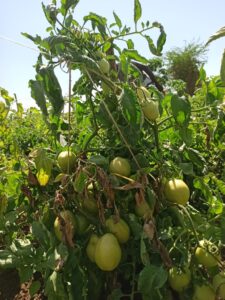
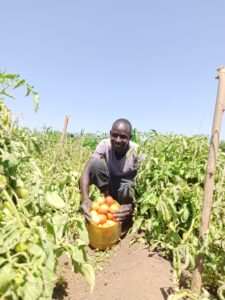
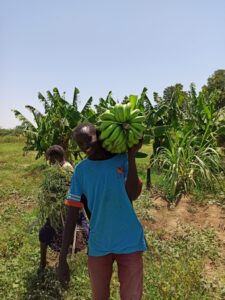
Ernest Lomuria; a farmer on the farm recounts why they began the farm. “We decided to venture into agriculture to be financially independent. We used to borrow money like most young people in the village. I am grateful that after a lot of work our plans worked out.” On his section of the 35-acre farm, Ernest has bananas and butternuts that he sells in the nearby market. “I sell most of my produce in Katilu Market although sometimes buyers come to the farm to source produce by themselves.”
He recounts how his life and those of other farmers have changed since he ventured into farming. “Despite the challenges that we face, our lives have changed for the better. Many of us have married and continue to support their families through this farm. I have developed a lot at a personal level from the proceeds of this farm.”
Despite the successes, the farmers face challenges that affect their productivity. “The fall armyworm really affects our crops especially maize. The market is also a challenge because the local markets do not give the best bargain.” Ernest said.
The IMPACT Program actively supports such farms through training, extension services, farm inputs such as seeds, and the building of irrigation infrastructure. The Program is working to provide market linkages so that farms such as Israel can access better markets for their produce.
Part of the content adapted from PanAfricare website.





